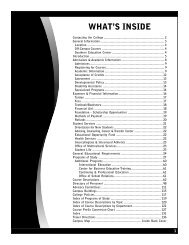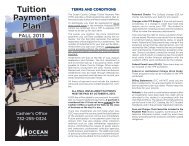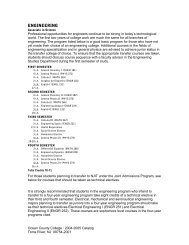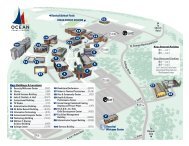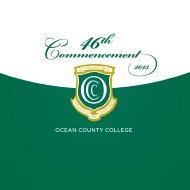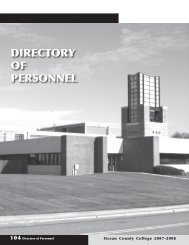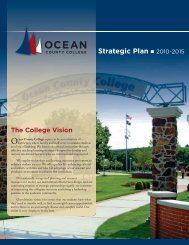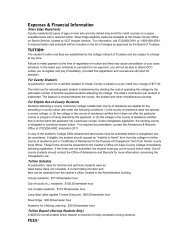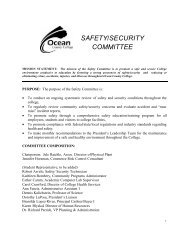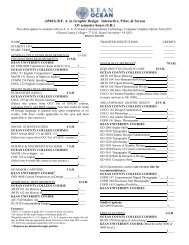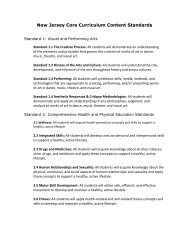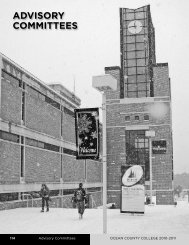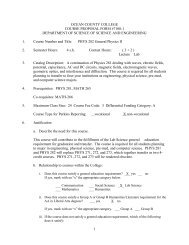2009-2010 - Ocean County College
2009-2010 - Ocean County College
2009-2010 - Ocean County College
Create successful ePaper yourself
Turn your PDF publications into a flip-book with our unique Google optimized e-Paper software.
OCC GENERAL EDUCATION GOALS & OBJECTIVES<br />
Based on the NJ Community <strong>College</strong>s/AOA General Education Foundation<br />
(1997 Adopted, August 15, 2007 Revision)<br />
New Jersey Community <strong>College</strong> General Educational Philosophy: Students are empowered to meet twenty-first century challenges through learning<br />
processes that lead to knowledge acquisition, skills mastery, critical thinking, and the exercise of personal, social, and civic responsibilities.<br />
The <strong>College</strong>’s maintain responsibility for offering a general education program, whose learning objectives facilitate attainment of all NJCC Gen<br />
Ed Learning Goals. Course-level learning objectives must be consistent with the <strong>College</strong>-Wide Learning Objectives that fulfill the NJCC Gen Ed<br />
Learning Goals. (Local general education courses must also be consistent with NJCC GE Course Criteria for satisfying requirements).<br />
NJCC Goal<br />
Categories<br />
1<br />
Written & Oral<br />
Communication<br />
(Communication)<br />
2<br />
Quantitative<br />
Knowledge & Skills<br />
(Mathematics)<br />
3<br />
Scientific Knowledge<br />
& Reasoning<br />
(Science)<br />
4<br />
Technological<br />
Competency or<br />
Information Literacy<br />
(Technology)<br />
5<br />
Society and Human<br />
Behavior<br />
(Social Science)<br />
NJCC Gen. Ed.<br />
Learning Goals<br />
Students will communicate<br />
effectively in both speech and<br />
writing.<br />
Students will use appropriate<br />
mathematical and statistical<br />
concepts and operations to<br />
interpret data and to solve<br />
problems.<br />
Students will use the scientifi c<br />
method of inquiry, through<br />
the acquisition of scientifi c<br />
knowledge.<br />
Students will use computer<br />
systems or other appropriate<br />
forms of technology to achieve<br />
educational and personal goals.<br />
Students will use social<br />
science theories and concepts<br />
to analyze human behavior and<br />
social, economic, and political<br />
institutions and to act as<br />
responsible citizens.<br />
<strong>College</strong>-Wide General Education Learning Objectives<br />
a. Students will explain and evaluate what they read, hear, and see.<br />
b. Students will state and evaluate the views and fi ndings of others.<br />
c. Students will logically and persuasively state and support orally and in writing their points of view or fi ndings.<br />
d. Students will evaluate, revise, and edit their communication.<br />
a. Students will translate quantifi able problems into mathematical terms and solve these problems using mathematical or<br />
statistical operations.<br />
b. Students will construct graphs and charts, interpret them, and draw appropriate conclusions.<br />
a. Applying the scientifi c method, students will analyze a problem and draw conclusions from data and evidence.<br />
b. Students will distinguish between scientifi c theory and scientifi c discovery, and between science and its scientifi c<br />
technological applications, and they will explain the impact of each on society.<br />
a. Students will use computer systems and/or other appropriate forms of technology to present information.<br />
b. Students will use appropriate forms of technology to identify, collect, and process info.<br />
c. Students will use appropriate library/learning resource tools such as cataloging systems to access information in<br />
reference publications, periodicals, bibliographies, and data bases.<br />
d. Students will recognize when information is needed and be able to locate, evaluate, and use information.<br />
a. Students will analyze and discuss behavioral or societal issues using theories and concepts from a social science<br />
perspective.<br />
b. Students will explain how social institutions and organizations infl uence individual behavior.<br />
c. Students will describe and demonstrate how social scientists gather and analyze data and draw conclusions.<br />
d. Students will apply civic knowledge both locally and globally and engage in activities that exercise personal, social, and<br />
civic responsibility.<br />
6<br />
Humanistic<br />
Perspective<br />
(Humanities)<br />
Students will analyze works<br />
in the fi elds of art, music, or<br />
theater; literature; philosophy<br />
and/or religious studies; and/or<br />
will gain competence in the use<br />
of a foreign language.<br />
a. Students will describe commonly used approaches and criteria for analyzing works*.<br />
b. Students will analyze works* applying commonly used approaches and criteria.<br />
c. Students will demonstrate profi ciency in the production and comprehension of a foreign language.<br />
*In the fi elds of art, music, or theater; literature; philosophy and/or religious studies and possibly within the context of<br />
studying and using a language other than English.<br />
7<br />
Historical Perspective<br />
(History)<br />
8<br />
Global & Cultural<br />
Awareness<br />
9<br />
Ethical Reasoning &<br />
Action<br />
10<br />
Independent/Critical<br />
Thinking<br />
Students will understand<br />
historical events and<br />
movements in World, Western,<br />
non-Western or American<br />
societies and assess their<br />
subsequent signifi cance.<br />
Students will understand<br />
the importance of a global<br />
perspective and culturally<br />
diverse peoples.<br />
Students will understand<br />
ethical issues and situations.<br />
Students will demonstrate<br />
independent/critical thinking<br />
in the humanities, natural<br />
sciences, and social sciences<br />
a. Students will state the causes of a major historical event and analyze the impact of that event on a nation or civilization.<br />
b. Students will discuss a major idea, movement, invention or discovery, and how it affected the world or American society.<br />
c. Students will demonstrate how writers’ interpretations of historical events are infl uenced by their time, culture, and<br />
perspective.<br />
a. Students will link cultural practices and perspectives with geographic and/or historical conditions from which they arose<br />
and evaluate the contributions of people from various nations and/or cultures.<br />
b. Students will explain why an understanding of differences in people’s backgrounds is particularly important to American<br />
society.<br />
c. Students will recognize and explain the possible consequences of prejudicial attitudes and discriminatory actions.<br />
d. Students will be exposed to global linkages in economics, politics, business, health, and other shared cultural concerns.<br />
a. Students will analyze and evaluate the strengths and weaknesses of different perspectives on an ethical issue or a<br />
situation.<br />
b. Students will take a position on an ethical issue or a situation and defend it.<br />
a. Students will interpret and evaluate literary and visual art based on stylistic and contextual analysis.<br />
b. Students will arrive at solutions through hypothesis, inquiry, analysis, and interpretation in studying the natural sciences.<br />
c. Students will synthesize diverse ideas and information and draw valid inferences in studying the social sciences.<br />
Note: This document should be used in conjunction with the General Education Foundation (8-15-2007) and the NJCC GE Course Criteria (8-15-2007).<br />
30 Academic Degrees & General Education Requirements<br />
OCEAN COUNTY COLLEGE <strong>2009</strong>-<strong>2010</strong>



